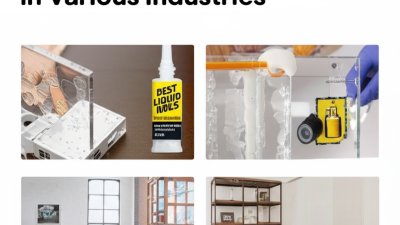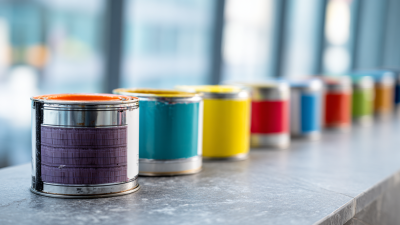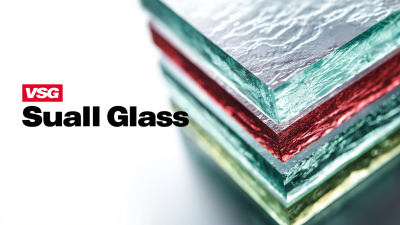Inquiry
Form loading...
When embarking on any project that involves glass insulation, selecting the right adhesive is crucial for achieving durability and performance. One of the most effective options available is Insolating Glass Silicon Glue, known for its exceptional bonding properties and versatility. However, with countless products on the market, choosing the right one can be overwhelming. This blog will guide you through seven essential tips for selecting the ideal Insolating Glass Silicon Glue for your specific needs. Whether you're a DIY enthusiast or a professional contractor, understanding the key characteristics and considerations will ensure that your projects not only meet structural requirements but also withstand the test of time. Join us as we explore the vital factors that will help you make an informed decision and achieve outstanding results in your glass insulation projects.

When it comes to selecting the right insulating glass silicon glue for your projects, the first step is to precisely identify your project requirements. Assessing the type of glass is crucial—consider not only the thickness and thermal characteristics of the glass but also the environmental conditions it will be exposed to. For instance, high-performance buildings often utilize low-emissivity (Low-E) glass, which may require specific silicone formulations that ensure adhesive strength and transparency, thereby maintaining the aesthetic appeal.
In addition to the type of glass, understanding the application is equally important. Different projects may involve varied exposure to elements like moisture and UV light, which can influence the longevity and performance of the adhesive. For exterior projects, a silicone glue with enhanced weather resistance might be essential. Meanwhile, interior applications could allow for more flexibility in product choice, prioritizing ease of use and curing time. By carefully evaluating these factors, you can select a silicone glue that not only meets the technical needs of your project but also contributes to its overall durability and effectiveness.
| Aspect | Details |
|---|---|
| Type of Glass | Single, Double, or Triple Glazing |
| Application | Residential, Commercial, or Industrial |
| Temperature Resistance | Up to 300°C |
| Curing Time | 24 hours to full strength |
| Viscosity | Medium to High |
| UV Resistance | Yes |
| Environmental Considerations | Non-toxic, Low VOC |
When selecting insulating glass silicone glue for your projects, one of the most critical factors to evaluate is its temperature resistance. Adhesives are often subjected to fluctuating environmental conditions, and if the glue cannot withstand temperature changes, it may lead to bond failure. Look for silicone formulations specifically designed for high performance under extreme temperatures, as these will maintain their integrity whether exposed to scorching heat or freezing cold.

Additionally, consider the specific applications of your project. Different environments pose unique challenges; for instance, glass installations in sunny locations may face amplified heat, while those in colder regions must cope with icy conditions. Thus, selecting an adhesive with a broad temperature range ensures reliable adhesion, crucial for the longevity of your projects.
Always check the technical data sheet provided by the manufacturer to ensure the silicone glue meets or exceeds the temperature requirements of your application, so you can rest easy knowing your bond will endure through the seasons.
When selecting insulating glass silicone glue for your projects, one critical factor to consider is its UV stability. According to a report by the American Society of Testing and Materials (ASTM), adhesives exposed to UV radiation for extended periods can experience significant degradation, leading to bond failure and compromised structural integrity. This is especially pertinent for applications in sunny environments where UV exposure can be high. A silicone adhesive with robust UV resistance is essential to ensure that your projects endure harsh sunlight without losing their effectiveness.
Research indicates that UV-resistant silicone glues can maintain their adhesive properties up to 50% longer than standard formulations when subjected to direct sunlight. This has profound implications, particularly for the construction and glazing industries, where long-term durability is paramount. Moreover, manufacturers like Dow and Sika have developed specialized silicone products that boast excellent UV stability, providing an additional layer of protection for glass installations exposed to the elements. By prioritizing UV stability, you can safeguard your projects against potential failures and extend their lifespan significantly.
When selecting insulating glass silicone glue for your projects, understanding the cure time is crucial. The adhesive must strike a balance between efficiency and quality in adhesion. A faster curing time can be tempting for those looking to expedite their projects, but rushing the process may compromise the bond's strength and durability. It’s essential to assess the specific needs of your project to determine if a quick-setting adhesive is appropriate or if allowing for a longer cure time would yield a superior result.

Moreover, different applications may have varying requirements for adhesion strength and environmental resilience. For instance, a project exposed to extreme weather conditions may benefit from a silicone glue with a longer cure time, enhancing its ability to form a strong, long-lasting bond. Therefore, while efficiency is important, never underestimate the role that proper curing plays in the overall performance of the adhesive.
Prioritize quality to ensure that your projects stand the test of time.
When selecting the right insulating glass silicon glue for your projects, compatibility with other materials is crucial. Many projects involve various substrates, and it’s essential to ensure that the glue will adhere effectively to all chosen surfaces. According to recent adhesive research, the bond strength can vary significantly depending on the materials involved. For instance, silicon glue often operates best with glass, ceramics, and some metals but can struggle with plastics or certain foams if not specifically formulated for such tasks.
Tips for Choosing the Right Adhesive: Always review the manufacturer's compatibility guidelines and conduct a test bond if possible. This simple step can save you time and frustration down the line. Additionally, consider the environmental factors your project will face, such as moisture and temperature fluctuations, as these can affect the adhesive’s performance. A comprehensive understanding of the materials at hand will lead to more robust and reliable outcomes in your projects.






